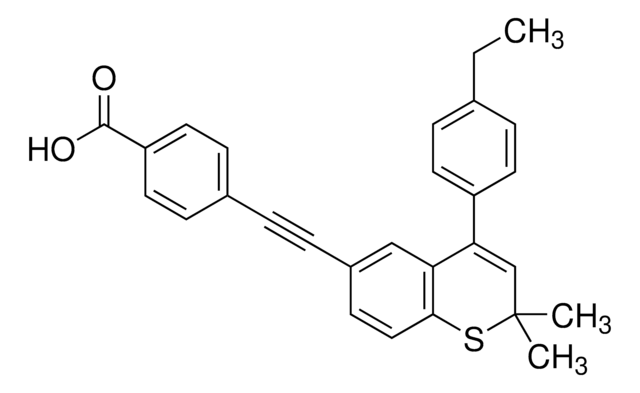SML0921
AR7
≥98% (HPLC)
Sinónimos:
7-Chloro-3-(4-methylphenyl)-2H-1,4-benzoxazine; 7-Chloro-3-p-tolyl-2H-benzo[b][1,4]oxazine, Atypical retinoid 7
About This Item
Productos recomendados
Quality Level
assay
≥98% (HPLC)
form
powder
color
white to beige
solubility
DMSO: 20 mg/mL, clear
storage temp.
2-8°C
Application
- as chaperone-mediated autophagy (CMA) activator to study the activity of CMA in rat liver lysosomes
- as a CMA activator to study its effects on expression of DEAD-box helicase 3 X-linked (DDX3X), eukaryotic translation initiation factor 4A1 (EIF4A1), and eukaryotic translation initiation factor 4H (EIF4H) in cancer cells
- to study its effects on synuclein α (SNCA) oligomer levels in mature primary cortical neurons
Biochem/physiol Actions
signalword
Warning
hcodes
pcodes
Hazard Classifications
Aquatic Acute 1 - Aquatic Chronic 1
Storage Class
11 - Combustible Solids
wgk_germany
WGK 3
flash_point_f
Not applicable
flash_point_c
Not applicable
Certificados de análisis (COA)
Busque Certificados de análisis (COA) introduciendo el número de lote del producto. Los números de lote se encuentran en la etiqueta del producto después de las palabras «Lot» o «Batch»
¿Ya tiene este producto?
Encuentre la documentación para los productos que ha comprado recientemente en la Biblioteca de documentos.
Nuestro equipo de científicos tiene experiencia en todas las áreas de investigación: Ciencias de la vida, Ciencia de los materiales, Síntesis química, Cromatografía, Analítica y muchas otras.
Póngase en contacto con el Servicio técnico









